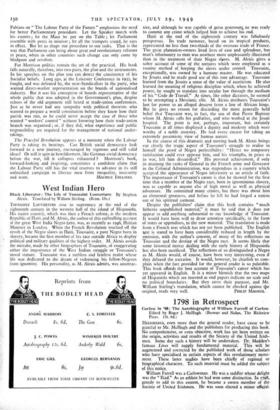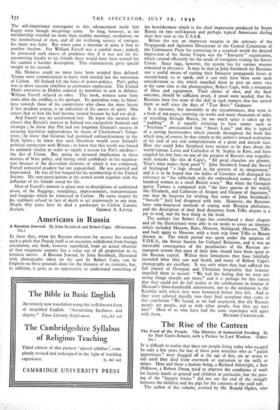1798 in Retrospect
HISTORIANS, even more than the general reader, have cause to be grateful to Mr. McHugh and the publishers for producing this book. No comprehensive, or even objective, work has yet been written on the origin, activities and results of the Society of the United Irish- men. Some day such a history will be undertaken. Dr. Madden's famous Lives will supply fundamental material. This will be augmented and corrected by the published work of those scholars who have specialised in certain aspects of this revolutionary move- ment. These latter studies have been chiefly of regional or biographical character. To such material must be added the subject of this notice.
William Farrell was a Carlowman. He was a saddler whose delight was the "Iliad." As an athlete he had won some distinction. In 1798, greedy to add to this esteem, he became a sworn member of the Society of United Irishmen. He was soon elected a minor official. The self-importance consequent to this advancement made him happy even though misgivings came. So long, however, as his membership entailed no more than stealthy meetings, resolutions on the brotherhood of man, and all the titillating secrecy of intrigue, his heart was light. But when came a murmur of arms it beat to another rhythm. For William Farrell was a careful man ; indeed, he possessed such excess of prudence that if it was not for his unswerving loyalty to his friends there would have been earned for his caution a harsher description. This characteristic gives special weight to his records.
His Nemesis could no more have been avoided than delayed. Troops were commissioned to harry with martial law the townsmen of Carlow. All Ireland felt the force of power-politics. Pitt's policy was to drive nascent rebellion to premature expression. The United Men's executive in Dublin ordered its members to arm in defence. William Farrell refused to obey. This book, written some forty years after thc conflict, is his apologia. Its querulous tone, its bitter- ness towards those of his countrymen who chose the more heroic if less prudent course, is an indication of his unrest of spirit. One senses that to him life had become tainted because he had not died.
And Farrell was no uninformed fool. He knew (his memoir dis- closes) that Britain's interest in Ireland was exclusively financial and strategic ; he knew that Pitt had not forgotten Grattan's success in securing legislative independence by threat of Charlemont's Volun- teers; he knew that Grattan had promised enfranchisement to the Irish helots ; he knew that such liberalism would sever Ireland's political connection with Britain ; he knew that this revolt was forced to untimely vitality in order to supply a reason for Pitt's antidote— the Act of Union. But, seeing no personal implication in these matters of State policy, and having small confidence in his organisa- tion because of the discordant elements of which it was composed, Farrell remained prudent but not unpunished. He was arrested and imprisoned. He was all but hanged for his membership of the United Society. His non-participation in the armed revolt together with the influence of his friends saved his life.
Most of Farrell's memoir is given over to descriptions of authorised arson, of the floggings, stranglings, imprisonments, transportations and hangings which he witnessed in Carlow. He earns respect by his stubborn refusal in face of death to act traitorously to any man. Nearly fifty years later he died a gatekeeper to Carlow Lunatic



































 Previous page
Previous page